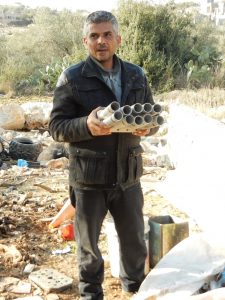Joining me in Palestine, my husband’s 11 pm flight to Istanbul was delayed (snowstorms) seven hours resulting in two lost nights of sleep and lots of anxiety, which culminated in the loss of his luggage. Then on our bus ride from Jerusalem to Ramallah, the bus sideswiped a car resulting in the loss of electricity for the bus and the jamming closed of the baggage compartment door where my bag had been safely stored. It seems that our luggage karma is unusually bad. Maybe the goddess of benighted travelers has deserted us after the last election.
Today we set off for the village of Bil’in, population 2,000 and the topic of the famous film, 5 Broken Cameras. The air is cold and the sun is shining on the roller coaster streets and the impressive, shining building boom of Ramallah. Passing Beituna and heading south we see gorgeous views of rolling rugged hills, terraced olive groves, clusters of children walking to school. We drive through Ein Arik, a small village with a tall thin minaret, famous water wells, houses dotting the hillsides.
Suddenly we come upon a flying checkpoint, three IDF jeeps parked across the road with nine heavily armed soldiers wearing oversized head gear blocking all traffic. They are looking for children and teenagers to “invite” for interrogation. At the prison the children are not allowed to have parents or lawyers for the “talk;” interrogators break the weaker ones to name names and report on their friends. We creep along and are finally waved through. The young doctor driving us to Bil’in was pulled aside when he returned to Ramallah, but they did not issue him an “invitation.”
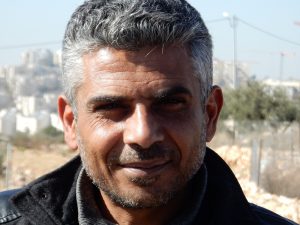
Iyad Burnat, the leader of the popular struggle in the village against the aggressive encroachment of the Israeli settlement, Modi’in Illit, and the massive concrete wall built on the land of the villagers, meets us at the mosque and drives us in his battered old car through Bil’in, winding up and down streets to a cul de sac of homes. The original village is hundreds of years old. Some of these newer homes are elegantly finished, some partially built over years of effort, with lovely white stone, balconies, arched windows. They are all owned by members of his wife’s family. His land was taken by the settlement. Sitting in the sun with chickens clucking and cats meowing in the background, Iyad looks tired, he is suffering from dizziness and I worry about all the stress and trauma that he and his family experience on a daily basis.
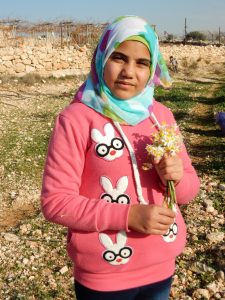
We meet his wife, a 17 year old son, a younger daughter, a dynamo of a three year old boy who wakens from a nap, snuggles with his baba, and then charges into constant motion, usually carrying two sticks and chirping a stream of imaginary scenarios. His oldest son Majd attends Birzeit University; every day taking several services to school so he is not home. In 2014, he was targeted and shot in the leg by Israeli snipers. Now, he has difficulties walking. His father bears the weight of knowledge that his son was not targeted by accident and that now he is worried about his 17 year old who “plays” with the soldiers with the lack of vulnerability that is characteristic of teenage boys who have experienced more than their share of violence and trauma.
Iyad explains that the flying checkpoints around the village have become a daily interference; that the Shabak takes the youth’s IDs, and then they have to report to Ofer Prison for interrogation. The scare tactics are designed to produce collaborators. “Do you know this guy? What is he doing? Demonstrations? Throwing stones?” The frightened boys either talk or lie and are then caught in their lie. In 2006 three children were arrested and the next week 30 children and adults were arrested. The most recent three children arrested were detained for three to four days. The villagers have educated the children on what to do, mostly to answer, “I don’t know.” “What is your name?” “I don’t know. You have my ID, you know my name.” Iyad’s brother was jailed for ten years. When he was released he studied law, “he saw the injustice.” Now he works at Ofer Prison defending the arrested. Iyad describes his 17 year old as “good but crazy,” he is “distracted by the wall.” Both of them keep snapping their finger joints, the tension is palpable. The young man is interested in studying computer engineering. Last year the IDF called him on his cell phone and said, “Be ready, we want to visit you.” Most of these “visits” occur at night, terrifying the child and the entire family. The son was accepted at a US university and has support from friends in the states but needs an additional $10,000 per year which is almost impossible.
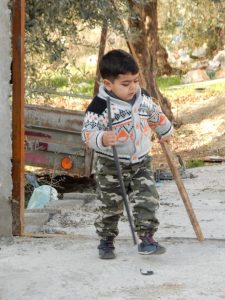
The teenager lights up when he sees his baby brother and is soon playful and affectionate. Iyad shows us a series of extraordinary photos. Two weeks ago, the three year old led the weekly Friday demonstration, carrying a Palestinian flag. The commander told him, “Go back.” He replied, “No, I want to see the jeep.” The IDF soldier repeated his command, but the defiant three year old marched forward and sat down in front of the jeep. Then he picked up a gas bomb strewn on the ground and said, “I don’t like this, it is yours,” and handed the empty cartridge to the soldier. Iyad is clearly proud and terrified. He explains, “The Zionists say that you teach your children to hate. This is not the way with Palestinian children. We have lots of Jewish visitors and friends. We teach them to talk with the soldiers and not to be scared. More stronger not to have a gun than to shoot from far away.” I give the child a puppet and a box of crayons which he clutches to his chest, but he is soon screaming when we leave with his father. He is, after all, only three years old.
We head towards a newly paved road that leads to the fields and the wall; the road is under demolition orders. On our left Iyad points out areas B (Palestinian civil control, Israeli military control) and C (Israeli everything). That means that in area C Palestinians can farm, but they cannot build anything, sheds, water pumps, water pipes, electricity, fences. On the right is a shrine to Bassem, a beloved activist who was killed by Israeli forces. We see piles of large rocks, the site of the previous apartheid wall that was moved closer to the settlement after years of struggle.
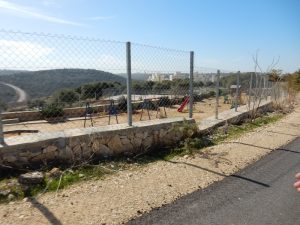
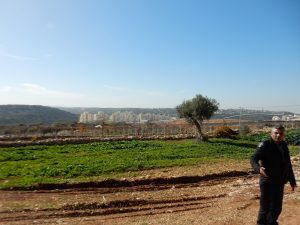
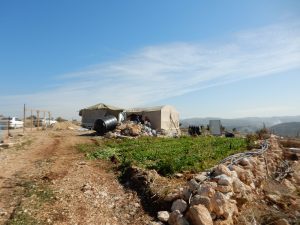
Grapes and olives have been replanted and there is a garden and new playground, both under demolition orders. Adjacent to a previously destroyed farmer’s house, there is structure with canvas walls, a table, couches, a gas burner where meals and coffee are cooked.
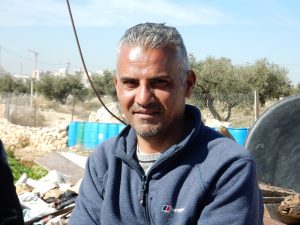 A group of farmers, including Iyad’s brother Emad, the filmmaker, are talking and smoking. Gorgeous rows of spinach, cauliflower, and broccoli are growing happily with drip and sprinkler irrigation. The water is bought in the village from the Israeli company, Mekorot, and then pumped into the fields. In winter there is enough rain, but in summer, water is necessary even though farmers plant less water hungry crops. This winter is unusually dry. As we approach the western lands, the massive settlement of Modi’in Illit, population 60,000, and its extension eastward, increasingly dominate the landscape.
A group of farmers, including Iyad’s brother Emad, the filmmaker, are talking and smoking. Gorgeous rows of spinach, cauliflower, and broccoli are growing happily with drip and sprinkler irrigation. The water is bought in the village from the Israeli company, Mekorot, and then pumped into the fields. In winter there is enough rain, but in summer, water is necessary even though farmers plant less water hungry crops. This winter is unusually dry. As we approach the western lands, the massive settlement of Modi’in Illit, population 60,000, and its extension eastward, increasingly dominate the landscape.
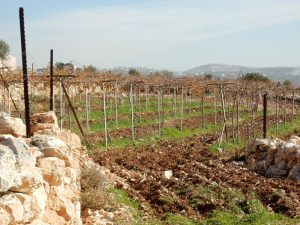
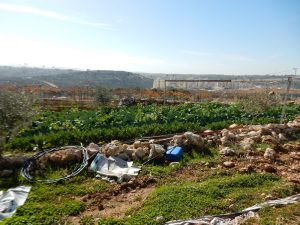
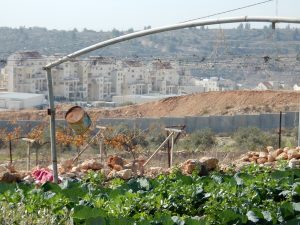
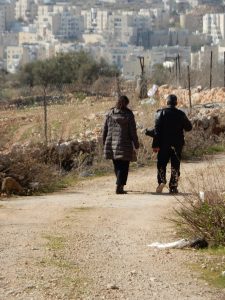
For me the contrast between the mammoth building project and this rural Palestinian landscape is frighteningly horrific. Huge cranes hover over massive apartment buildings stacked aggressively up the hills in various states of construction.
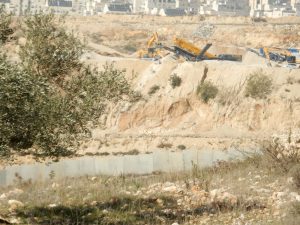 There is a Yeshiva and huge bulldozers and earthmoving equipment, mountains of dirt. The settlers are primarily white Ashkenazic Orthodox Jews, many from New York City, who feel they are fulfilling God’s promise to reclaim Judea and Samaria. The tone is aggressive, dominating; architecture as military maneuver. Iyad explains the green hill to the left will soon be covered by more settlement construction. In the valley between this city and the village is a bypass road and the concrete wall snaking along as far as I can see. And then there are the towers and the cameras able to surveille every detail of village life, as well as the distant pounding of machinery.
There is a Yeshiva and huge bulldozers and earthmoving equipment, mountains of dirt. The settlers are primarily white Ashkenazic Orthodox Jews, many from New York City, who feel they are fulfilling God’s promise to reclaim Judea and Samaria. The tone is aggressive, dominating; architecture as military maneuver. Iyad explains the green hill to the left will soon be covered by more settlement construction. In the valley between this city and the village is a bypass road and the concrete wall snaking along as far as I can see. And then there are the towers and the cameras able to surveille every detail of village life, as well as the distant pounding of machinery.
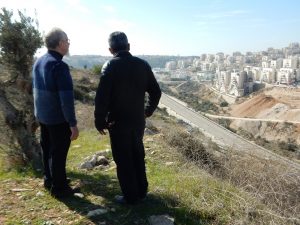
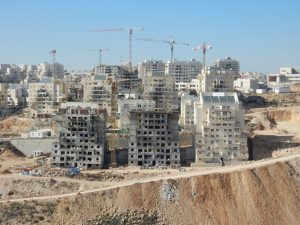
We walk through the incredibly rocky soil and Iyad talks accomplishments and dreams. “We are farmers. I love to grow food from the land.” He wants to plant his food, feed his family, live in peace, and to support other farmers in reclaiming this land and making it fertile and functional again. His father had 250 sheep and an intense attachment to the land as well. He keeps squatting amongst the plants and snapping a bit of fava beans or parsley or cilantro or peas or cauliflower; we munch happily as he explains.
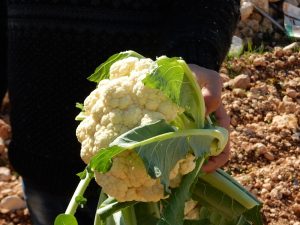 The soil is rejuvenated after years of neglect and the detritus of toxic weaponry by adding new top soil and manure. He is working on a proposal to reclaim a dunam of land for each farmer in need, build a greenhouse, fence each area against animals, and offer the farmers in the village the possibility of growing enough food to feed their families, summer and winter crops, having viable work, and the ability to sell their grapes or vegetables to pay for meat or water and electricity. There are 40-50 farmers in the village who have lost their land and another 50 who have taken other jobs. Preparing each dunam costs $12,000. Maybe Trump could hold off on the next war plane and donate to the cause. One would certainly do it.
The soil is rejuvenated after years of neglect and the detritus of toxic weaponry by adding new top soil and manure. He is working on a proposal to reclaim a dunam of land for each farmer in need, build a greenhouse, fence each area against animals, and offer the farmers in the village the possibility of growing enough food to feed their families, summer and winter crops, having viable work, and the ability to sell their grapes or vegetables to pay for meat or water and electricity. There are 40-50 farmers in the village who have lost their land and another 50 who have taken other jobs. Preparing each dunam costs $12,000. Maybe Trump could hold off on the next war plane and donate to the cause. One would certainly do it.
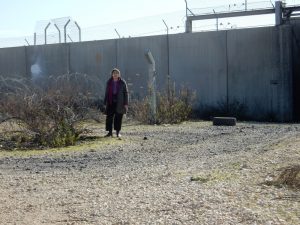
We sit with Emad and he talks of his film which had an amazing amount of success but didn’t appreciably change his life, he is still a farmer fighting the effects of occupation and settlement building. The Friday demonstrations ebb and flow in the various villages, in Bil’in they are down to 20-30 people marching, chanting, and running like hell when the teargas and skunk water rains down. He continues to travel extensively, has been to the US, has talked with Dustin Hoffman and Madonna and screened his film at the Sundance film festival. Michael Moore asked him, “Do you have a gun?” He replied, “Why I need a gun? I don’t want to kill people.” He just returned from South Africa where he met Nelson Mandela’s son. He says he found a positive response in South Africa because of the “similarities of the struggles,” but notes that in South Africa you still feel apartheid, see it every day. But you fell progress.” He adds, “You have to continue to tell the people about the struggle. If you stop telling your story, people forget.” But travel is exhausting and he has medical issues. Ben Gurion airport was 20 minutes away in the old days, but since Oslo, the airport is haram and he has to travel through the Allenby Bridge and Jordan which exhausting and time consuming.
We embark on the expected conversation about US foreign policy and our impending disaster of a president. He notes, “The US is not a democracy for the rest of the world…US makes enemies everywhere. Who pays? The people in the US. People don’t know about the world…government and media finance terrorism, they don’t understand why.” He thinks 9/11 was not perpetrated by Al Qaeda, it was used as an excuse to destroy Iraq and Afghanistan. “I saw an American soldier, he was in Iraq. He was telling the truth to the people. The rich want us to kill poor people to be more rich.”
We meet Gibreel his now teenage son who was the star of the film. He’s got black rimmed eye glasses and a firm handshake and is in his element with the other boys, riding bikes, checking the water, and being a part of the land.
There is a debate going on of critical importance: shall we eat lunch with the farmers, freshly picked spinach and arugula and tomatoes and cauliflower, cooked on the flame in the blackened pot that serves as the kitchen or shall we return to Iyad’s house to eat maqluba with his wife and family. They decide he will drive back home and he will return with the maqluba and family and we will all enjoy the feast, sitting, standing in the tent or out in the sun.
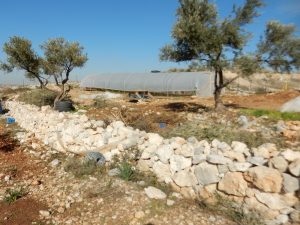
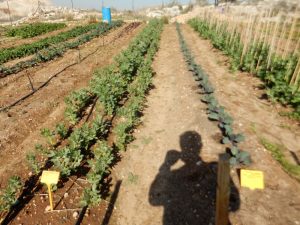 As we wait, I meet Kefah, a curly haired local guy with a law degree who has returned to the family lands to create an organic farm with raised beds and a variety of vegetables and a greenhouse. We had just been admiring the lush rows of arugula, peas, parsley, clusters of sweet smelling narcissus. Reddening tomatoes peek out from under the greenhouse plastic walls. Sitting on old lumpy couches and uncomfortable white plastic chairs, he explains that an American citizen born in a refugee camp in Gaza, studied in the United Arab Emirates, came to visit the West Bank, and then the Israelis in their infinite wisdom refused to let him leave due to his Gaza ID. So he looked for land to start an organic farm that would be owned by the people who work on it, and found a plot here owned by Kefah’s uncle.
As we wait, I meet Kefah, a curly haired local guy with a law degree who has returned to the family lands to create an organic farm with raised beds and a variety of vegetables and a greenhouse. We had just been admiring the lush rows of arugula, peas, parsley, clusters of sweet smelling narcissus. Reddening tomatoes peek out from under the greenhouse plastic walls. Sitting on old lumpy couches and uncomfortable white plastic chairs, he explains that an American citizen born in a refugee camp in Gaza, studied in the United Arab Emirates, came to visit the West Bank, and then the Israelis in their infinite wisdom refused to let him leave due to his Gaza ID. So he looked for land to start an organic farm that would be owned by the people who work on it, and found a plot here owned by Kefah’s uncle.
They started in February 2016, convincing local farmers that they could farm and make money, rejuvenating the land. He was joined by Kefah and a friend with business knowledge. They were modeling the structure after community supported agriculture (CSA’s) in the US. Because this flourishing organic garden is in area C where everything is forbidden except “agriculture,” there is a demolition or stop work order on every aspect of their project. “We are expecting demolishment. We went to the Israeli court, not sure they will accept the case. We are here every day. The Israelis only focus on this one area. We are activists here, we are ready for that and we will rebuild and rebuild.” I can’t tell if this is incredibly inspirational or somewhat delusional or maybe both.
He admits they are still learning, water is expensive, there are strong winds and an endless supply of stones, plus thousands of tear gas canisters, gas bombs, and the unknown chemical burden of skunk water. The other challenge is a reliable source of seeds which is difficult to impossible to import.
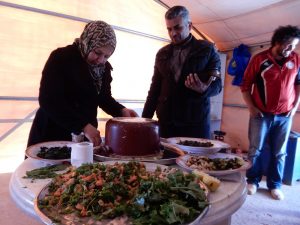 Iyad arrives with his wife and a huge pot of maqluba which she expertly flips over and a crowd gathers to enjoy the steaming feast. I sit opposite an elderly grandmother who looks to be in her 80s. She has a very wrinkled face, is missing teeth, gasping a bit for breath followed by a sigh, and clutching a bag of pills. She wears a traditional embroidered dress and is holding her seven month old wide eyed dumpling of a grandchild who captivates me with her endless eyelashes. I almost grab the kid from her lap, given my lonesome heart for my own eight month old granddaughter, and soon the dumpling snuggles in and proceeds to fall asleep. My heart melts. I learn that the grandmother had twelve children and is 69 years old. Many pregnancies and a life under occupation will do that.
Iyad arrives with his wife and a huge pot of maqluba which she expertly flips over and a crowd gathers to enjoy the steaming feast. I sit opposite an elderly grandmother who looks to be in her 80s. She has a very wrinkled face, is missing teeth, gasping a bit for breath followed by a sigh, and clutching a bag of pills. She wears a traditional embroidered dress and is holding her seven month old wide eyed dumpling of a grandchild who captivates me with her endless eyelashes. I almost grab the kid from her lap, given my lonesome heart for my own eight month old granddaughter, and soon the dumpling snuggles in and proceeds to fall asleep. My heart melts. I learn that the grandmother had twelve children and is 69 years old. Many pregnancies and a life under occupation will do that.
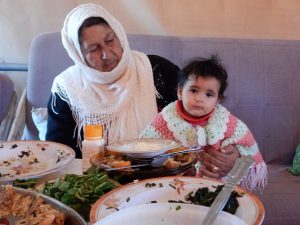
We return for a tour of Iyad’s home which he designed and built with his family. In his backyard is a industrial size plastic bag filled with the remnants of devices for shooting over 200 teargas canisters at a time. One night his wife heard some noise and went out to the balcony where she saw IDF soldiers in her yard. One of the lobbed a tear gas canister into their open bedroom window. The most moral army in the world.
